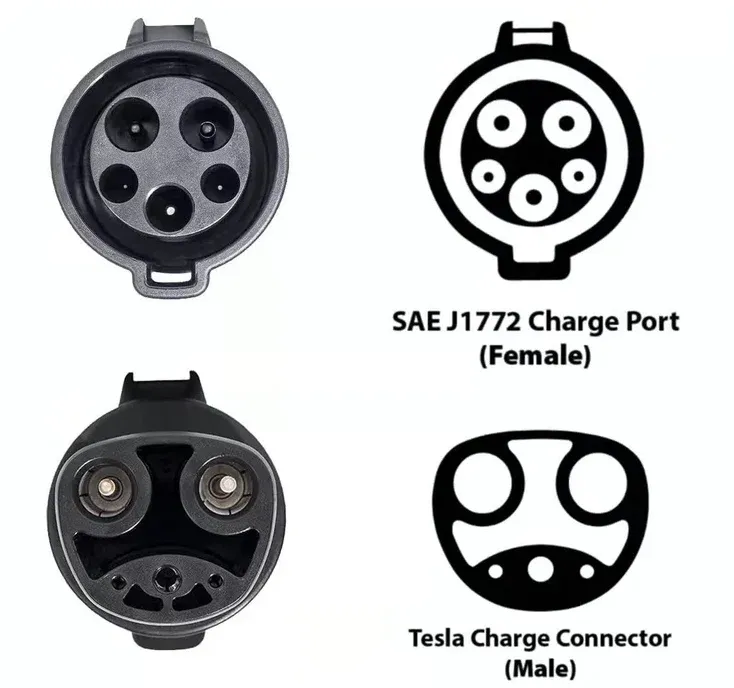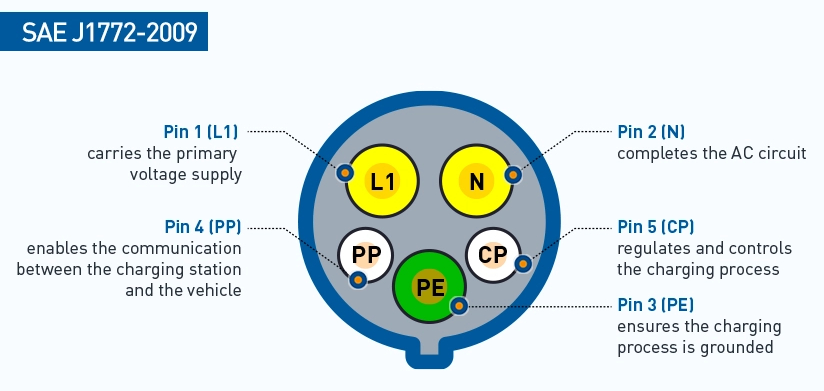As electric vehicles (EVs) continue to gain popularity in North America, a key enabler of this transition is the J1772 plug—also known as the SAE J1772 connector or simply the J-Plug. Developed by the Society of Automotive Engineers (SAE), the J1772 connector has become the standard AC charging interface for almost all electric vehicles across the United States and Canada. It plays a pivotal role in supporting EV adoption by offering a universal, reliable, and safe means of transferring power from charging stations to EVs.
The J1772 plug is compatible with virtually every non-Tesla EV, including models from Chevrolet, Ford, Honda, Hyundai, Kia, Nissan, and Toyota, among others. Although Tesla uses a proprietary plug design, Tesla drivers can still use public J1772 charging stations with the help of a compatible adapter. This compatibility ensures broader access to public charging networks and helps establish uniformity in EV infrastructure.
In essence, the J1772 connector is not just a technical component—it is a cornerstone of the North American electric mobility revolution. From home charging setups to public charging points in shopping centers and office complexes, the J1772 plug ensures that EV drivers can charge their vehicles with convenience and confidence.

At first glance, the J1772 plug may appear unassuming, but its design is a result of careful engineering. The connector features a five-pin layout, which includes:
Two power pins – For carrying the 120V or 240V AC electricity.
One ground pin – For safe operation.
Two communication pins – For signaling between the EV and the charging station.
These communication pins are essential because they facilitate an intelligent exchange of information between the EV and the charger. For instance, the charger can determine whether the vehicle is plugged in correctly and whether it is safe to begin the charging process. This handshake process enhances safety and operational efficiency.
The connector also features an ergonomic design with robust construction, weatherproof seals, and secure locking mechanisms to prevent accidental disconnection during charging. The standardization of the J1772 plug has ensured consistent compatibility across countless EV models and charging station manufacturers.

The J1772 connector is specifically designed for AC (Alternating Current) charging. Unlike DC fast charging (which bypasses the vehicle’s onboard charger and feeds DC power directly to the battery), the J1772 relies on the car's onboard charger to convert AC to DC. This makes J1772 ideal for Level 1 and Level 2 charging scenarios.
Charging Rate: Adds approximately 4–5 miles of range per hour.
Use Case: Ideal for overnight charging at home using a standard household 3-prong outlet.
Setup: Plug-in portable charger into a NEMA 5-15 outlet (standard 120V socket).
Level 1 charging is the most basic form of EV charging. While it’s the slowest, it’s also the most accessible—every home has at least one outlet compatible with Level 1 chargers.
Charging Rate: Adds about 25–30 miles of range per hour.
Use Case: Ideal for both residential and public charging; perfect for daily top-ups or full overnight charges.
Setup: Requires a dedicated EVSE (Electric Vehicle Supply Equipment) and a NEMA 14-50 outlet or hardwired connection to a 240V circuit.
Level 2 charging is significantly faster than Level 1 and is preferred by most EV owners for daily use. Many public charging stations also rely on J1772 for Level 2 charging, making it the de facto standard for non-DC fast charging infrastructure.
While the J1772 plug is versatile and widely adopted, it is limited to AC charging. For rapid charging needs, drivers must use DC fast charging connectors such as CCS (Combined Charging System) or CHAdeMO. The J1772 interface simply does not support the high-voltage direct current required for ultra-fast charging.
That said, for the majority of daily driving needs, J1772's Level 2 charging speed is more than sufficient. Most EVs can be fully charged overnight, making it an ideal solution for residential charging scenarios.
The success of the EV ecosystem depends on more than just producing vehicles—it requires a reliable, standardized, and accessible charging infrastructure. The J1772 plug is essential for several reasons:
Thanks to its widespread adoption, the J1772 connector ensures that EVs from multiple automakers can share charging infrastructure. Whether you're driving a Hyundai IONIQ 5, a Chevrolet Bolt, or a Nissan Leaf, a public J1772 charging station will likely work seamlessly.
Public charging stations across North America—from gas stations and shopping malls to office buildings and parking garages—commonly feature J1772 connectors. This makes it easier for EV drivers to plan trips without worrying about compatibility issues.
Even though Tesla uses its proprietary plug, the company provides J1772 adapters to enable Tesla drivers to use non-Tesla public charging stations. This further extends the reach of the J1772 network.
The inclusion of communication pins enables smart features like current control, charging delay, and safety lockout. These features prevent overheating, short-circuiting, or overcharging—ensuring both user safety and battery longevity.
One of the biggest advantages of owning an EV is the ability to charge at home. While Level 1 chargers are plug-and-play, most EV owners opt to install a dedicated Level 2 J1772 home charging station for faster and more convenient charging.
A Level 2 charging station typically requires:
240V outlet
30 to 50 amps dedicated circuit
Proper breaker sizing based on the charger’s amperage rating
To ensure safety and code compliance, homeowners should:
Hire a licensed electrician
Conduct a load calculation on the main panel
Obtain permits and inspections if required by local authorities
Modern J1772 chargers come equipped with:
Wi-Fi or Bluetooth connectivity
Mobile app controls
Scheduled charging
Energy consumption monitoring
Smart features help users reduce electricity costs by charging during off-peak hours and tracking usage over time.
If installed outdoors, the charging unit should be:
NEMA-rated for outdoor use
Resistant to dust, rain, and temperature extremes
Here’s a rough breakdown of the potential cost to install a Level 2 J1772 charger at home:
|
Component |
Estimated Cost |
|
Level 2 J1772 Charger |
$400–$900 |
|
Electrical Work |
$300–$1,000 |
|
Permits & Inspections |
$50–$200 |
|
Total Installation |
$750–$2,100 |
Incentives and rebates are often available at the federal, state, or utility level, which can significantly reduce the cost of installation. Many programs offer rebates of up to $500 or more for purchasing and installing home EV charging equipment.
With North America gradually moving toward unified charging standards, J1772 remains a reliable solution for the current EV landscape, particularly for AC charging. However, the industry is also witnessing a growing push toward NACS (North American Charging Standard)—the proprietary connector developed by Tesla and now gaining traction with multiple automakers.
Several major EV manufacturers—including Ford, GM, Rivian, and Volvo—have announced plans to adopt NACS for new EV models starting in 2025, which may lead to eventual consolidation around a single charging standard.
Despite this shift, J1772 is not likely to disappear soon. Millions of existing EVs on the road rely on J1772 connectors, and public charging networks will continue to support them for years to come.
The J1772 plug has played a foundational role in establishing North America’s electric vehicle charging ecosystem. As a universal AC charging standard, it offers unparalleled compatibility, reliability, and ease of use. Whether charging at home, at work, or on the go, the J1772 plug ensures that EV drivers have access to a robust and flexible charging infrastructure.
As the EV market continues to expand and evolve, the J1772 connector remains an indispensable part of the charging landscape—bridging the gap between today's electric mobility needs and tomorrow’s zero-emission future.
